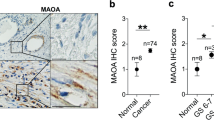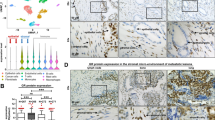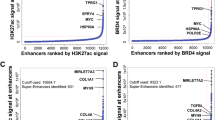Abstract
DNA damage found in prostate cancer-associated fibroblasts (CAF) promotes tumor progression. In the absence of somatic mutations in CAF, epigenetic changes dictate how stromal coevolution is mediated in tumors. Seventy percent of prostate cancer patients lose expression of transforming growth factor-beta type II receptor (TGFBR2) in the stromal compartment (n=77, P-value=0.0001), similar to the rate of glutathione S-transferase P1 (GSTP1) silencing. Xenografting of human prostate cancer epithelia, LNCaP, resulted in the epigenetic Tgfbr2 silencing of host mouse prostatic fibroblasts. Stromal Tgfbr2 promoter hypermethylation, initiated by LNCaP cells, was found to be dependent on interleukin 6 expression, based on neutralizing antibody studies. We further found that pharmacologic and transgenic knockout of TGF-β responsiveness in prostatic fibroblasts induced Gstp1 promoter methylation. It is known that TGF-β promotes DNA stability, however, the mechanism is not well understood. Both prostatic human CAF and mouse transgenic knockout of Tgbr2 had elevated DNA methyltransferase I (DNMT1) activity and histone H3 lysine 9 trimethylation (H3K9me3) to suggest greater promoter methylation. Interestingly, the conditional knockout of Tgfbr2 in mouse prostatic fibroblasts, in modeling epigenetic silencing of Tgfbr2, had greater epigenetic gene silencing of multiple DNA damage repair and oxidative stress response genes, based on promoter methylation array analysis. Homologous gene silencing was validated by reverse transcriptase (RT)–PCR in mouse and human prostatic CAF. Not surprisingly, DNA damage repair gene silencing in the prostatic stromal cells corresponded with the presence of DNA damage. Restoring the expression of the epigenetically silenced genes in wild-type fibroblasts with radiation-induced DNA damage reduced tumor progression. Tumor progression was inhibited even when epigenetic silencing was reversed in the Tgfbr2-knockout prostatic fibroblasts. Taken together, fibroblastic epigenetic changes causative of DNA damage, initiated by association with cancer epithelia, is a dominant mediator of tumor progression over TGF-β responsiveness.
This is a preview of subscription content, access via your institution
Access options
Subscribe to this journal
Receive 50 print issues and online access
$259.00 per year
only $5.18 per issue
Buy this article
- Purchase on Springer Link
- Instant access to full article PDF
Prices may be subject to local taxes which are calculated during checkout





Similar content being viewed by others
References
Bhowmick NA, Chytil A, Plieth D, Gorska AE, Dumont N, Shappell S et al. TGF-beta signaling in fibroblasts modulates the oncogenic potential of adjacent epithelia. Science 2004; 303: 848–851.
Bhowmick NA, Neilson EG, Moses HL . Stromal fibroblasts in cancer initiation and progression. Nature 2004; 432: 332–337.
Nguyen DX, Bos PD, Massague J . Metastasis: from dissemination to organ-specific colonization. Nat Rev Cancer 2009; 9: 274–284.
Tuxhorn JA, Ayala GE, Smith MJ, Smith VC, Dang TD, Rowley DR . Reactive stroma in human prostate cancer: induction of myofibroblast phenotype and extracellular matrix remodeling. Clin Cancer Res 2002; 8: 2912–2923.
Olumi AF, Grossfeld GD, Hayward SW, Carroll PR, Tlsty TD, Cunha GR . Carcinoma-associated fibroblasts direct tumor progression of initiated human prostatic epithelium. Cancer Res 1999; 59: 5002–5011.
Cunha GR . Androgenic effects upon prostatic epithelium are mediated via trophic influences from stroma. Prog Clin Biol Res 1984; 145: 81–102.
Placencio VR, Sharif-Afshar AR, Li X, Huang H, Uwamariya C, Neilson EG et al. Stromal transforming growth factor-beta signaling mediates prostatic response to androgen ablation by paracrine Wnt activity. Cancer Res 2008; 68: 4709–4718.
Qiu W, Hu M, Sridhar A, Opeskin K, Fox S, Shipitsin M et al. No evidence of clonal somatic genetic alterations in cancer-associated fibroblasts from human breast and ovarian carcinomas. Nat Genet 2008; 40: 650–655.
Campbell I, Polyak K, Haviv I . Clonal mutations in the cancer-associated fibroblasts: the case against genetic coevolution. Cancer Res 2009; 69: 6765–6768.
Jeronimo C, Usadel H, Henrique R, Oliveira J, Lopes C, Nelson WG et al. Quantitation of GSTP1 methylation in non-neoplastic prostatic tissue and organ-confined prostate adenocarcinoma. J Natl Cancer Inst 2001; 93: 1747–1752.
Lengauer C, Kinzler KW, Vogelstein B . Genetic instabilities in human cancers. Nature 1998; 396: 643–649.
Coppe JP, Patil CK, Rodier F, Sun Y, Munoz DP, Goldstein J et al. Senescence-associated secretory phenotypes reveal cell-nonautonomous functions of oncogenic RAS and the p53 tumor suppressor. PLoS Biol 2008; 6: 2853–2868.
Ohuchida K, Mizumoto K, Murakami M, Qian LW, Sato N, Nagai E et al. Radiation to stromal fibroblasts increases invasiveness of pancreatic cancer cells through tumor-stromal interactions. Cancer Res 2004; 64: 3215–3222.
Placencio VR, Li X, Sherrill TP, Fritz G, Bhowmick NA . Bone marrow derived mesenchymal stem cells incorporate into the prostate during regrowth. PLoS One 2010; 5: e12920.
Ahles TA, Saykin AJ . Candidate mechanisms for chemotherapy-induced cognitive changes. Nat Rev Cancer 2007; 7: 192–201.
Massague J . TGFbeta signalling in context. Nat Rev Mol Cell Biol 2012; 13: 616–630.
Kim SJ, Im YH, Markowitz SD, Bang YJ . Molecular mechanisms of inactivation of TGF-beta receptors during carcinogenesis. Cytokine Growth Factor Rev 2000; 11: 159–168.
Li X, Placencio V, Iturregui JM, Uwamariya C, Sharif-Afshar AR, Koyama T et al. Prostate tumor progression is mediated by a paracrine TGF-beta/Wnt3a signaling axis. Oncogene 2008; 27: 7118–7130.
Jackson RS 2nd, Placzek W, Fernandez A, Ziaee S, Chu CY, Wei J et al. Sabutoclax, a Mcl-1 antagonist, inhibits tumorigenesis in transgenic mouse and human xenograft models of prostate cancer. Neoplasia 2012; 14: 656–665.
Hodge DR, Cho E, Copeland TD, Guszczynski T, Yang E, Seth AK et al. IL-6 enhances the nuclear translocation of DNA cytosine-5-methyltransferase 1 (DNMT1) via phosphorylation of the nuclear localization sequence by the AKT kinase. Cancer genomics proteomics 2007; 4: 387–398.
Lee SO, Lou W, Hou M, de Miguel F, Gerber L, Gao AC . Interleukin-6 promotes androgen-independent growth in LNCaP human prostate cancer cells. Clin Cancer Res 2003; 9: 370–376.
Du Z, Song J, Wang Y, Zhao Y, Guda K, Yang S et al. DNMT1 stability is regulated by proteins coordinating deubiquitination and acetylation-driven ubiquitination. Sci Signal 2010; 3: ra80.
Dakhova O, Ozen M, Creighton CJ, Li R, Ayala G, Rowley D et al. Global gene expression analysis of reactive stroma in prostate cancer. Clin Cancer Res 2009; 15: 3979–3989.
Sun Y, Campisi J, Higano C, Beer TM, Porter P, Coleman I et al. Treatment-induced damage to the tumor microenvironment promotes prostate cancer therapy resistance through WNT16B. Nat Med 2012; 18: 1359–1368.
Cahill DP, Kinzler KW, Vogelstein B, Lengauer C . Genetic instability and darwinian selection in tumours. Trends Cell Biol 1999; 9: M57–M60.
Fearon ER, Cho KR, Nigro JM, Kern SE, Simons JW, Ruppert JM et al. Identification of a chromosome 18q gene that is altered in colorectal cancers. Science 1990; 247: 49–56.
Tuxhorn JA, Ayala GE, Rowley DR . Reactive stroma in prostate cancer progression. J Urol 2001; 166: 2472–2483.
Maruyama R, Choudhury S, Kowalczyk A, Bessarabova M, Beresford-Smith B, Conway T et al. Epigenetic regulation of cell type-specific expression patterns in the human mammary epithelium. PLoS Genet 2011; 7: e1001369.
Krtolica A, Parrinello S, Lockett S, Desprez PY, Campisi J . Senescent fibroblasts promote epithelial cell growth and tumorigenesis: a link between cancer and aging. Proc Natl Acad Sci USA 2001; 98: 12072–12077.
Dumont N, Wilson MB, Crawford YG, Reynolds PA, Sigaroudinia M, Tlsty TD . Sustained induction of epithelial to mesenchymal transition activates DNA methylation of genes silenced in basal-like breast cancers. Proc Natl Acad Sci USA 2008; 105: 14867–14872.
Kantarjian H, Giles F, List A, Lyons R, Sekeres MA, Pierce S et al. The incidence and impact of thrombocytopenia in myelodysplastic syndromes. Cancer 2007; 109: 1705–1714.
Kantarjian H, Issa JP, Rosenfeld CS, Bennett JM, Albitar M, DiPersio J et al. Decitabine improves patient outcomes in myelodysplastic syndromes: results of a phase III randomized study. Cancer 2006; 106: 1794–1803.
Shen H, Laird PW . In epigenetic therapy, less is more. Cell Stem Cell 2012; 10: 353–354.
Trobridge P, Knoblaugh S, Washington MK, Munoz NM, Tsuchiya KD, Rojas A et al. TGF-beta receptor inactivation and mutant Kras induce intestinal neoplasms in mice via a beta-catenin-independent pathway. Gastroenterology 2009; 136: 1680–1688 e7.
Grady WM, Willis J, Guilford PJ, Dunbier AK, Toro TT, Lynch H et al. Methylation of the CDH1 promoter as the second genetic hit in hereditary diffuse gastric cancer. Nat Genet 2000; 26: 16–17.
Martinez-Ferrer M, Afshar-Sherif AR, Uwamariya C, de Crombrugghe B, Davidson JM, Bhowmick NA . Dermal transforming growth factor-beta responsiveness mediates wound contraction and epithelial closure. Am J Pathol 2010; 176: 98–107.
Li X, Martinez-Ferrer M, Botta V, Uwamariya C, Banerjee J, Bhowmick NA . Epithelial Hic-5/ARA55 expression contributes to prostate tumorigenesis and castrate responsiveness. Oncogene 2010; 30: 167–177.
Kiskowski MA, Jackson RS 2nd, Banerjee J, Li X, Kang M, Iturregui JM et al. Role for stromal heterogeneity in prostate tumorigenesis. Cancer Res 2011; 71: 3459–3470.
Weber M, Davies JJ, Wittig D, Oakeley EJ, Haase M, Lam WL et al. Chromosome-wide and promoter-specific analyses identify sites of differential DNA methylation in normal and transformed human cells. Nat Genet 2005; 37: 853–862.
Oliveros JC . 2007. http://www.bioinfogp.cnb.csic.es/tools/venny/index.html.
Acknowledgements
The work was supported by R01CA108646 (to NAB) from the National Cancer Institute.
Author information
Authors and Affiliations
Corresponding author
Ethics declarations
Competing interests
The authors declare no conflicts of interest.
Additional information
Supplementary Information accompanies this paper on the Oncogene website
Supplementary information
Rights and permissions
About this article
Cite this article
Banerjee, J., Mishra, R., Li, X. et al. A reciprocal role of prostate cancer on stromal DNA damage. Oncogene 33, 4924–4931 (2014). https://doi.org/10.1038/onc.2013.431
Received:
Revised:
Accepted:
Published:
Issue Date:
DOI: https://doi.org/10.1038/onc.2013.431
Keywords
This article is cited by
-
Differential enrichment of H3K9me3 in intrahepatic cholangiocarcinoma
BMC Medical Genomics (2022)
-
TGF-β controls stromal telomere length through epigenetic modifications
3 Biotech (2022)
-
Alterations in the methylome of the stromal tumour microenvironment signal the presence and severity of prostate cancer
Clinical Epigenetics (2020)
-
Heterogeneous cancer-associated fibroblast population potentiates neuroendocrine differentiation and castrate resistance in a CD105-dependent manner
Oncogene (2019)
-
Attenuation of TGFBR2 expression and tumour progression in prostate cancer involve diverse hypoxia-regulated pathways
Journal of Experimental & Clinical Cancer Research (2018)



